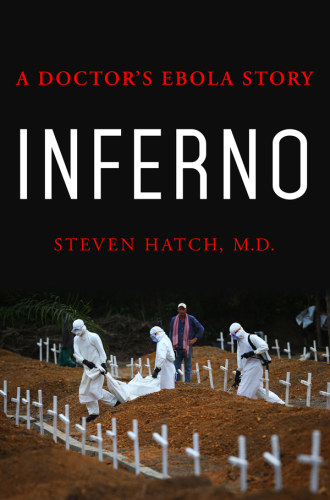
Inferno
A Doctor's Ebola Story
داستان ابولا اثر داتور
کتاب های مرتبط
- اطلاعات
- نقد و بررسی
- دیدگاه کاربران
نقد و بررسی

Starred review from January 23, 2017
Hatch, a physician and assistant professor of medicine at the University of Massachusetts Medical School, rivetingly recounts his work in an Ebola treatment unit in Liberia at the height of the deadly West African outbreak in 2014–2015. He breathtakingly narrates his “battle of a lifetime” while retaining a steely-eyed focus on the human tragedy. From the first death Hatch witnesses to the first survival of a patient under his care, he chronicles what it meant to go from “watching the world’s leading story to being the world’s leading story.” Professionally, he appreciates the critical role of nurses and the importance of touch, faces his own failures, and evaluates the good and bad of media coverage. On a personal level, Hatch gives stunning witness to the devastating loss caused by Ebola, including that of a father who survived the virus who then cares for his dying son. “We all knew that the was a place of hellish misery,” yet “despite that knowledge, we were able to keep on with our jobs,” Hatch writes. “Our cheer and hope were among our only weapons in the darkness.” Hatch’s chronicle is a compassionate, clear-eyed, and courageous account of how compassionate medical care proves a formidable force against the ravages of Ebola. Agent: Andy Ross, Andy Ross Agency.

January 1, 2017
An American doctor describes his experiences in Liberia during the 2014-2015 Ebola epidemic.Hatch (Infectious Disease and Immunology/Univ. of Massachusetts Medical School; Snowball in a Blizzard: A Physician's Notes on Uncertainty in Medicine, 2016; etc.) first went to Liberia in November 2013, months before the Ebola outbreak began in earnest, to volunteer at the John F. Kennedy Hospital in Monrovia. By the time the first confirmed cases of Ebola were registered in West Africa, Hatch had returned to his life and work in the United States. But he felt such obligation that eventually, after overcoming various bureaucratic hurdles, he returned to Liberia, to volunteer in an Ebola Treatment Unit in Bong County. His deployment lasted six weeks. Hatch narrates those experiences in detail, from the day-to-day problems of shaving, dressing in personal protective equipment in extreme heat, and dehydration to the horrors experienced by his patients, which he witnessed daily. Hatch is a capable writer; his descriptions are fluid, and his voice is engaging. However, he has a tendency to extrapolate at length on issues that are likely to be of less interest to readers--those bureaucratic hurdles, for example. Nor is Hatch entirely successful in achieving the outsized ambitions he lists at the beginning of the book, which include not only analyzing the causes, extent, and impact of the Ebola outbreak, but also the intent to "rob the virus of its metaphorical power, which requires calling attention to the institution of sub-Saharan African slavery and the changes it wrought on at least three continents." Still, Hatch's testimony is a useful addition to the popular literature about the Ebola outbreak. Despite occasional long-windedness, Hatch's analysis is intelligent, nuanced, and tempered, a necessary departure from the panicked response of most American media outlets.
COPYRIGHT(2017) Kirkus Reviews, ALL RIGHTS RESERVED.

Starred review from February 1, 2017
Hatch's (medicine, Univ. of Massachusetts) powerful, at times gut-wrenching memoir of his time working in West Africa to treat Ebola weaves a history of Liberia, public health information, and searing stories of death, hope, and heartbreak. The author narrates a doctor's ethical and professional commitment--how and why he felt so compelled to treat the outbreak. He lucidly and movingly describes his daily work on the Ebola treatment unit, and the costs and rewards of trying to help others regain health in a region with few medical resources, where technologies taken for granted in more developed countries are simply not available. Along with the story it tells of disease, this title also reveals the ways that war, colonialism, and dictatorships have affected health care in Liberia, and in different ways, the state of health in Africa as a whole. Hatch's writing is elegant, and at times deeply moving as he shares the pathos of his patients, the staff of the treatment unit, and his own hopes and frustrations. VERDICT Readers who are interested in global health, medical education, and biographies in general will be moved by this account for its humanity, honesty, and lucid writing. [See Prepub Alert, 9/19/16.]--Aaron Klink, Duke Univ., Durham, NC
Copyright 2017 Library Journal, LLC Used with permission.

Starred review from December 1, 2016
During the devastating Ebola outbreak in 2013 and 2014, Hatch, a doctor and an assistant professor of medicine at the University of Massachusetts specializing in infectious disease, traveled to Liberia to work in a temporary hospital. His experiences there and upon his return to the U.S. are the framework for this intensely detailed memoir that gives readers not only insight into the path of destruction wrought by the disease but also Liberia's complicated history with America, it's unique relationship with religion, and how it managed to tackle Ebola in the wake of a horrific civil war. That Hatch accomplishes all of this in an outstandingly well-written, page-turning memoir in which he focuses far more on the people he worked with and treated than on his own feelings is nothing short of a literary miracle. Inferno educates, illuminates, and rivets as Hatch rails against the political circumstances that allowed Ebola to flourish and aims his flinty pen at the U.S. media's condescending determination to make a Liberian story more about Western saviors than African victims. This is a masterful work that deserves sharp noticetruly, a game changer that should share a shelf with the works of Philip Gourevitch and Adam Hochschild.(Reprinted with permission of Booklist, copyright 2016, American Library Association.)

























دیدگاه کاربران